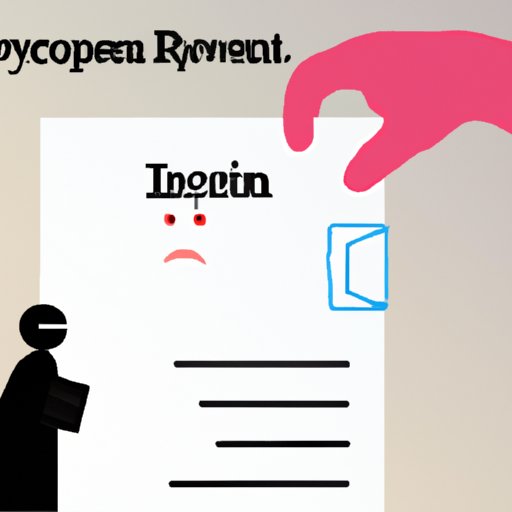Introduction
Leaving a job is never easy, especially when you haven’t been there for very long. You may feel like you’re letting down your colleagues or that you are wasting their time, but it’s important to remember that sometimes things just don’t work out. If you find yourself in a position where you need to resign from a job you just started, it’s important to do it professionally and with respect. This article will provide advice on how to resign from a job you just started, including tips on drafting a professional and polite letter of resignation, giving appropriate notice to your employer, discussing the situation with your supervisor, offering to help with the transition, and requesting a reference.
Draft a Professional and Polite Letter of Resignation
The first step in resigning from a job you just started is to draft a professional and polite letter of resignation. This should be sent to both your supervisor and HR department. Your letter should include the date of your notice, the date of your last day at the company, and an explanation for why you are leaving. It is also a good idea to thank your employer for the opportunity.
When writing your letter, it is important to use professional language. Avoid using negative or accusatory language, as this could damage your reputation. Be concise and direct, and make sure to proofread your letter before sending it. Here is an example of a professional resignation letter:
“Dear [Name],
I am writing to inform you that I am resigning from my position as [Position] with [Company], effective [Date].
I appreciate the opportunity to have worked with [Company] and have enjoyed my time here. However, I have decided that this is not the right fit for me, and I must pursue other opportunities.
Thank you again for the opportunity to work with [Company]. I wish you and your team all the best.
Sincerely,
[Your Name]
Give Appropriate Notice to Your Employer
Once you have drafted your letter of resignation, you should give appropriate notice to your employer. Depending on the terms of your contract, you may be required to give two weeks’ notice or more. If you cannot provide this amount of notice, you should discuss it with your employer and explain why. It is important to be honest and respectful.
According to a 2018 survey by Accountemps, a staffing firm, “Seventy-seven percent of human resources (HR) managers said two weeks is the standard amount of notice employees should give when resigning.”

Discuss the Situation with Your Supervisor
After you have given notice to your employer, it is important to discuss the situation with your supervisor. This can be a difficult conversation, but it is important to remain professional and courteous. Before having the conversation, it is a good idea to prepare what you want to say. Write down any questions you may have and think about how you would like to phrase your answers.
It is also important to be aware of your body language during the conversation. Maintain eye contact, sit up straight, and be sure to listen to what your supervisor has to say. This will show that you are taking the conversation seriously.
Offer to Help with the Transition
Once you have discussed the situation with your supervisor, it is important to offer to help with the transition. This can be done in a variety of ways, such as training a replacement, helping to hire a new employee, or providing documentation and instructions for future tasks. Offering to help with the transition shows that you are still committed to the success of the company, even after you leave.
A 2017 study conducted by the University of Pennsylvania found that “employees who stay connected to their former employers after leaving tend to experience greater career satisfaction and higher wages in their new roles.”

Request a Reference from Your Previous Employer
Before leaving your job, it is a good idea to request a reference from your previous employer. This can be done in person or via email. When asking for a reference, be sure to express your appreciation for the opportunity you had and emphasize the skills you developed while working there. This will show your former employer that you are serious about your career and will help you build connections in the future.

Stay Positive and Keep an Open Mind
Finally, it is important to stay positive and keep an open mind when resigning from a job you just started. Remember that you have made the decision because it was the best option for you, and that there are likely other opportunities out there. Keeping a positive attitude will help you stay motivated and resilient during the job search process.
A 2015 study by the University of California found that “job seekers who approach the process with a positive attitude and open mind tend to have better outcomes than those who focus primarily on the negatives.”
Conclusion
Resigning from a job you just started can be a difficult process, but it is important to remain professional and courteous throughout. The key steps are to draft a professional and polite letter of resignation, give appropriate notice to your employer, discuss the situation with your supervisor, offer to help with the transition, and request a reference from your previous employer. Finally, it is important to stay positive and keep an open mind. With these tips, you can resign from your job with confidence and grace.
(Note: Is this article not meeting your expectations? Do you have knowledge or insights to share? Unlock new opportunities and expand your reach by joining our authors team. Click Registration to join us and share your expertise with our readers.)
